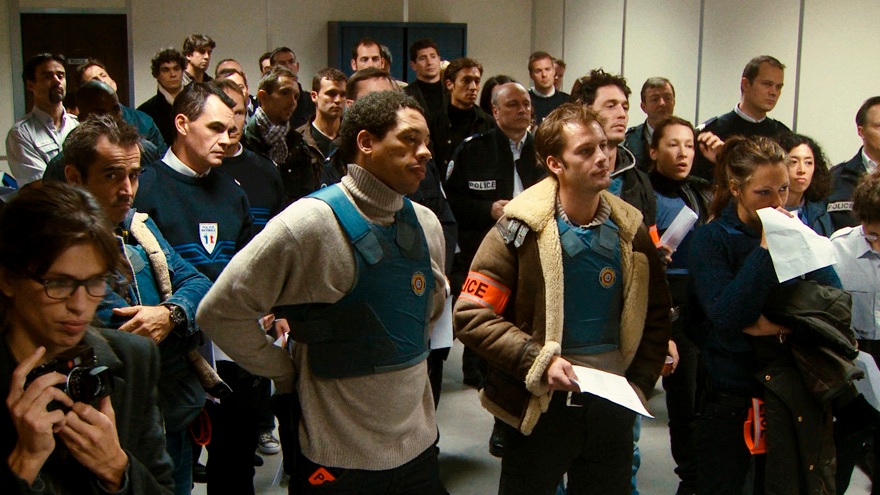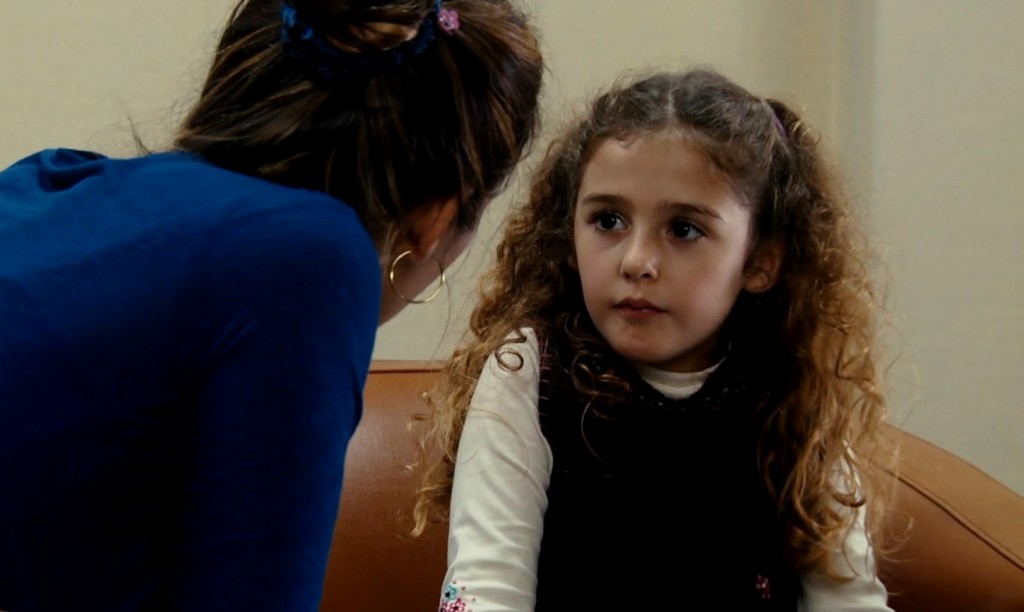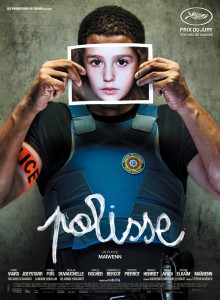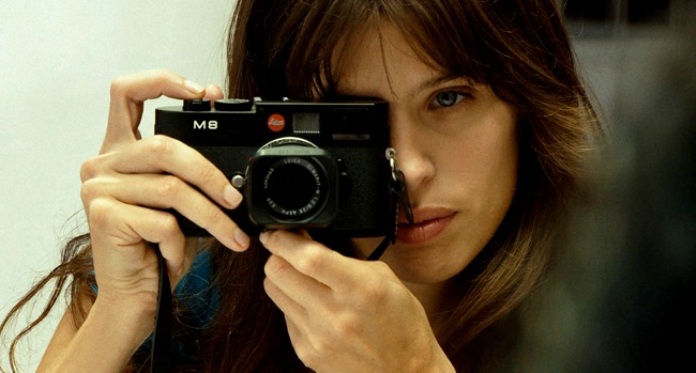
Maïwenn (actress of “The Fifth Element” and “High Tension”) is the director, co-writer and co-star of the new French import Polisse, opening on May 18th in Los Angeles and New York, then to other market roll-outs in the following weeks. With her film, you get something like two dozen dramatized case studies. The pile up of incidents happen randomly and concurrently for the Child Protection Unit, and the workload crosses over each other. All the cops are working on multiple cases at once. This must be close to real life. You get a wide encompassing portrayal of the messiness of life and occupation, and how it can all merge simultaneously and haphazardly. Read the review: click here.
“Polisse” (French with English subtitles) is easily the best film so far of 2012. I believe it is among the five or six best French films of the last twenty years. If I were to compose a list of other French films of hall of fame value I would include “Red” (1994); “Monsieur Hire” (1990); “Enter the Void” (2009), “The Widow of St. Pierre” (2000); “Amelie” (2001).
To promote her Cannes Film Festival Jury Prize winner, Maïwenn has arrived at the Four Seasons in humble spirits. Her English is not sharp, but it is good enough, but with the aid of an interpreter we were able to get more comprehensive questions to be understood by her. This is her third film, but the first to get a U.S. theatrical release. She likes the mobile verité camera style. She likes to send her kids off to school and then work 9 a.m. to 6 p.m. through the day on writing and research, production and development, and get back to her family in the evenings. For the film shoot, she worked as much as necessary for her 60-day film shoot. Her police drama isn’t a gallery of bank robberies or homicides, however. It’s about endangered children in homeless environments, abuses in high-rise tenements, or quiet defilement in bourgeoisie homes by perverted and arrogant fathers. This different look at this subject is what makes “Polisse” so original.
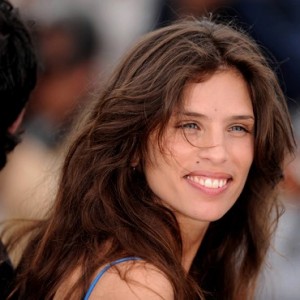 One on one with Maïwenn from Los Angeles:
One on one with Maïwenn from Los Angeles:
First off, I want to tell you that I think your film is extraordinary.
Maïwenn: Hmm. Thank you.
I think this is the best French film since 1990’s “Monsieur Hire.” [Maïwenn Smiles] I think it’s better than work by the Dardenne Brothers, Gasper Nöe, or anything else by Patrice Leconte. That’s how special I think your film is. And when it comes to police procedurals, I don’t think I’ve seen anything as good since Michael Mann’s “Heat” (1995). This felt so well-researched. What kind of process did you go through to get your material?
Maïwenn: Before I did an internship I spent a lot of time to watch movies or documentaries. I talked so much and asked all the questions I wanted to.
In previous press reports, you had interviews and conversations with policemen?
Maïwenn: Yes.
Where did you have these conversations with cops?
Maïwenn: Lunch breaks, or before their morning shifts, or at the end of the day I would take them to dinner. Or sometimes I would do a ride-along in their police vehicles.
How many months did you do this for?
Maïwenn: I cannot really answer because the police asked me to not say so. But I did it enough technically to have an idea of their routine.
When it came up with case studies, were their particular cases that occurred in France that made you want to write this film? Any specific incidents?
Maïwenn: No. When I discovered a French documentary, I decided to meet the filmmakers. It’s not because of one case, no, it was from an overview. When I worked with them, they wanted me to tell my own film by funneling it in specific cases. I did that, but moreover, I just wanted to film the emotions of policemen at work – guarded, conflicted, self-tormented. Also, get to how they react in their private life. I didn’t care about one big [case].
How did you find the child actors?
Maïwenn: I did a big casting call for actor kids and non-actor kids. I met their parents to make sure the child actors would feel comfortable with me. That a level of trust could be shared, and that they could listen.
What kind of qualifications were you looking for in the children?
Maïwenn: I wanted to feel that even if they weren’t spontaneous in front of the camera… the only thing I was looking for is to see they would cooperate with me. Feel that I could massage their sensibility for the camera. Most of the young actors in the movie, they were so shy on first day of casting. Then other kids were so gregarious, “Hey Maiwenn, I’m an actor! I’m trained to act big with my emotions!” I’d be like no, no, they look like the kind that will overact.
So that showbiz kid actor quality is something you figured wouldn’t be good?
Maïwenn: Yes, showbizzy and show-offy. Not what I wanted.
The adult actors?
Maïwenn: I was looking for actors that were natural. I had to feel that they came from the street. Not so intellectual-actor type. Not the show-offy type to come on camera and sell their lines like a big salesperson personality or a prima donna. The actors had one week each with a policeman, so that they could be ready for the shoot. They were already feeling like cops by the first time of shooting.
Was it always the intent to give yourself a part?
Maïwenn: I wanted this photographer character in the film. It is the way for the viewer to identify with the scenery, through my character. I also wanted there to be a love story. I wanted to create a contrast of the abusing child material with a fiction love story instead of strictly a chronicle movie. I wanted to prove and show cops how they fall in love. Because all day long they deal with rape and incest. So how does a policeman deal and act with his body when he falls in love? It’s a human quality to observe that is different from viewing them strictly in their occupation.
Did you ever think about casting another actress in the part?
Maïwenn: I wanted to do it. I figured at the beginning of the shooting, though, that I made a mistake. The energy I needed as a director was opposite of the energy I needed as an actress. Because my character is not the leader of the group. She’s like a little cat in the room. She’s not the one that gives an energy to the group. As a director I need to be the one to achieve and push everybody with control, you know?
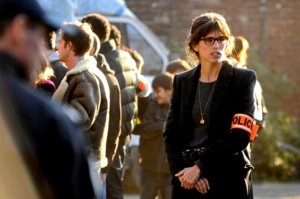 Her character is a bit of a wallflower?
Her character is a bit of a wallflower?
Maïwenn: Yes, exactly. I figured that it was a mistake to choose an “opposite” character while you are directing a movie at the same time. So I won’t do that again, not like that.
Is there something you want the audience to take away with them after the end credits roll?
Maïwenn: I want my audience to come away with their own mind and interpret things their own way.
What films did you grow up watching that inspired you?
Maïwenn: I love Ken Loach (“Sweet Sixteen”). I discovered him at an early age. I love James Gray (“Little Odessa”). And I love Michael Mann’s “Heat,” that’s one of my favorite films. I watched it so many times while I was writing the script.
Ha ha. I think the difference between your film and “Heat” is that Michael Mann, I think, took 8 years writing it and tweaking it –
Maïwenn: Eight years?!
Yes, writing and toying with it for eight years and yours only took 9 months. I would have assumed that your film took five years to write and make?
Maïwenn: He wasn’t lazy, was he?
The difference is that Mann obsessively rewrites his work to attract producers and investors, and is always working several movie projects at once.
Maïwenn: Ahh. I was doing “Polisse” only.
You’re a one-project-at-a-time person?
Maïwenn: It’s like you ask me if I have many husbands. I’m that type can only love one man at a time.
You chose a verité style for this by having the camera stand-in as a human being, eyewitnessing the action? Is that a style you’re going to continue with each new film?
Maïwenn: Yes, it’s my style I’m good with. It is my way to make movies…. so I’m not going to change the way I am.
The interview ends. We both stand up to shake each other’s hands, I also shake hands with her interpreter aid. I reassure her that I am looking very forward to any new film will make in the future. She appears very ecstatic and pleased. Not just an attractive woman but a creative brain.
